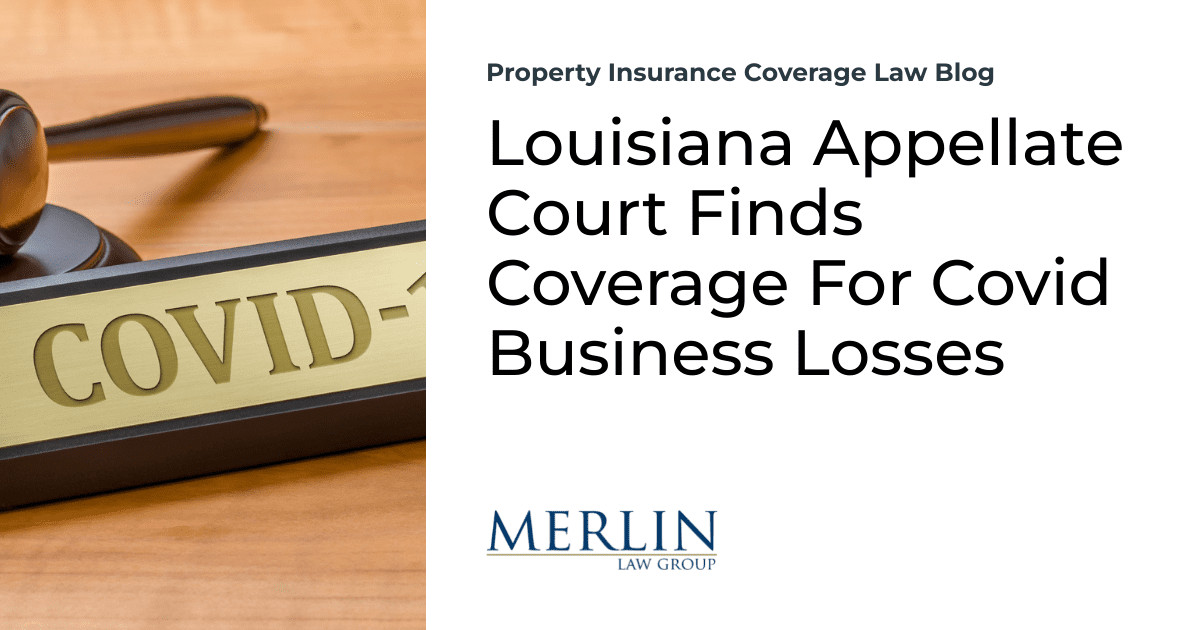Louisiana Appellate Court Finds Coverage For Covid Business Losses

The Louisiana Court of Appeals found that coverage exists for loss or damage caused by “direct physical loss of or damage to” the insured premises as a result of contamination by COVID-19.1 I have previously discussed the case following the trial in Chip At @2 Will Be At 2:30 With Update on New Orleans Oceana COVID Trial Won By the Insurer, and attached briefs and various depositions. John Houghtaling and other attorneys representing the policyholder deserve a big shout-out for bringing home a win. It was not easy.
The opinion reversed the trial court finding and held:
Upon review, we conclude that the insurance policy is ambiguous and capable of more than one reasonable interpretation in regards to the coverage of lost business income. Due to the existing ambiguity in the relevant policy language, the contract should be interpreted in favor of the appellants.
The Louisiana appellate court heavily relied upon Louisiana precedent, which finds coverage when the insured property is “rendered unusable or uninhabitable.”
The Supreme Court of Louisiana has previously defined the meaning of ‘direct,’ in relation to ‘loss or damage’ in an insurance contract, as signifying ‘immediate or proximate as distinguished from remote.’ Central Louisiana Elec. Co., Inc., 579 So. 2d at 985 n. 8 (citing Lorio v. Aetna Ins. Co., 255 La. 721, 232 So. 2d 490 (1970)). The appellants discussed this Court’s examination of what constitutes ‘direct physical loss of or damage to the property’ in Widder v. Louisiana Citizens Prop. Ins. Corp., a residential lead contamination case.
Widder held that physical damage was not necessary to trigger coverage in a homeowner policy because the insured property was ‘rendered unusable or uninhabitable.’ Widder, 11-0196, p. 4, 82 So. 3d at 296 (citing In re Chinese Manufactured Drywall Products Liability Litigation, 759 F. Supp. 2d 822 (E.D. La. 2010); Ross v. C. Adams Construction & Design, 10-852 (La. App. 5 Cir. 6/14/11), 70 So. 3d 949). Widder’s holding relies on a line of defective drywall cases wherein drywall installed on insured property was physically intact, but its inherent defects required that it be replaced in order for the property to be usable….
The court also noted similar findings from other jurisdictions:
[M]any cases in other jurisdictions have …extended coverage to losses arising from disease-causing agents with a tangible physical form but which are, nevertheless, not discernible with the naked human eye. See Port Authority of N.Y. and N.J. v. Affiliated FM Ins. Co., 311 F.3d 226, 235-36 (3d Cir. 2002) (holding that ‘physical loss or damage’ exists if asbestos fibers contaminate the insured property such that it is uninhabitable, or if there is an imminent threat of the release of a quantity of asbestos fibers that would cause a loss of utility’); See Farmers Ins. Co. of Or. v. Trutanich, 123 Or. App. 6, 858 P.2d 1332, 1335 (1993) (finding that odor is a ‘physical’ trait because it damaged the insured property and concluding that the “cost of removing the odor is a direct physical loss’); See Matzner v. Seaco Ins. Co., No. CIV. 96-0498-B, 1998 WL 566658, at *4 (Mass. Super. 1998) (ruling that ‘carbon-monoxide contamination constitutes ‘direct physical loss of or damage to’ property’). This Court, in Widder, joined this line of cases extending coverage for a broader array of losses caused by disease-causing agents with a tangible, but microscopic, physical form.
The court further noted that reference to dictionary definitions highlight the ambiguous nature of the word “loss.”
Reference to external definitions of ‘loss’ accentuate the ambiguity. Loss is defined in one dictionary as ‘the fact that you no longer have something or have less of something.’ Another dictionary provides that loss is the ‘destruction, ruin,’ ‘the act or fact of being unable to keep or maintain something or someone,’ and ‘the partial or complete deterioration or absence of a physical capability or function.’
In The Insurance Industry Teaches That a Cause of Loss Does Not Have to Alter Property, I recently challenged the concept that “physical loss” requires some alteration of evidence because the insurance industry teaches its own adjusters that it does not.
The court also noted that the insurance industry formulated an exclusion that would have eliminated the insurer’s liability, but the policy failed to contain such an exclusion:
Examining the evidence introduced by the appellants, it is apparent that at the time that the policy was issued, viral exclusions which eliminated the insurer’s liability for loss or damage caused by a virus were available on the market. However, the appellee did not include a viral exclusion in the policy it drafted and sold to the appellants.
Will this decision be the break in the dam leading to further policyholder wins? Who knows? Louisiana has precedent for this finding, and not all states do. In the Bayou State, business policyholders without a virus exclusion have a chance for coverage.
Thought For The Day
An American has not seen the United States until he has seen Mardi-Gras in New Orleans.
—Mark Twain
1 Cajun Conti v. Certain Underwriters at Lloyd’s, London, No. 2021-CA-0343 (La. App. June 15, 2022).







